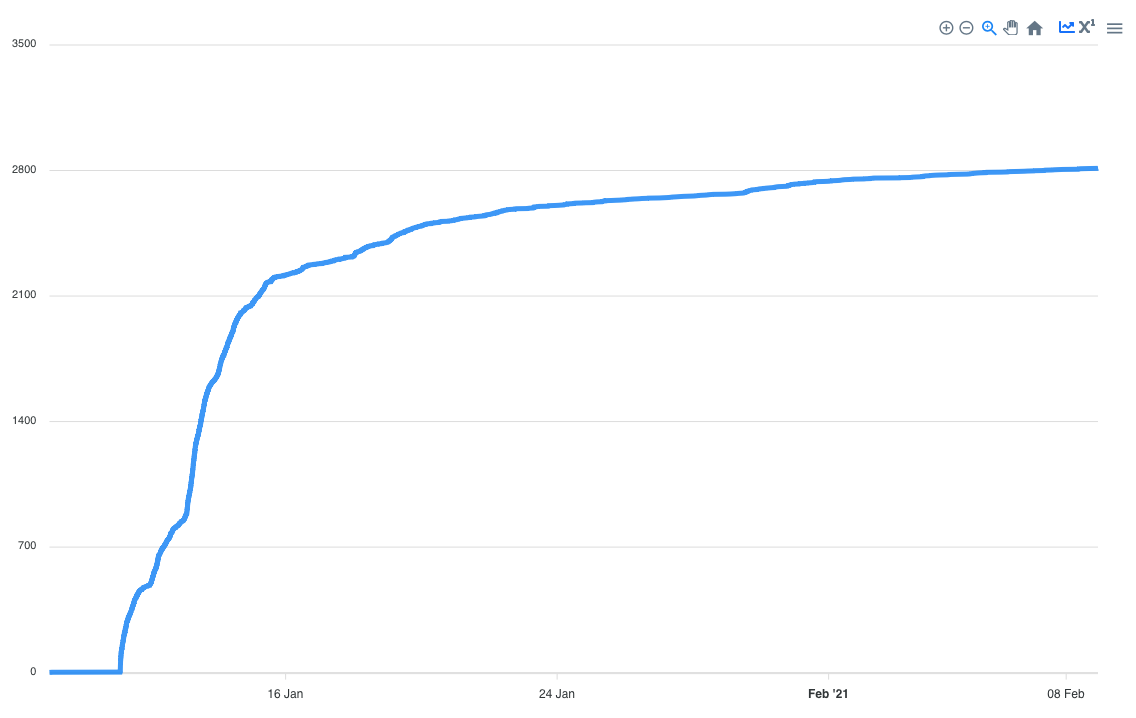30 days of open source, global attention
In the first month after the JuiceFS was open sourced from January 11, 2021, it has received more than 2800 stars on GitHub. As the foundation software of file system, it is quite unexpected to get such attention.

During this month, JuiceFS showed up in many places:
- Boarded the top 10 of Hacker News homepage, making us visible to developers around the world;
- Enter No. 8 of GitHub Trending list and No. 1 of Go language category;
- Listed in Programmer Weekly and Golang Weekly;
- Featured on InfoQ China homepage;
- A lot of attention from Twitter.
Releasing Kubernetes CSI Driver to help containerize stateful applications
In recent years, the containerization of enterprise application has made rapid progress, but a large number of existing applications in the industry are stateful design, the storage layer relies on the NAS for data sharing, and most of them are purchased hardware, which are difficult to scale and complicated to operate, is no longer suited to the cloud native environment.
There is the concept of “Persistent Volume” in Kubernetes to help the containerization of stateful applications, and now there is the CSI standard for configuration management, which is not difficult but still lacks a simple and easy to use distributed file system in the cloud. The GlusterFS and CephFS are very complicated in operation and maintenance, and teams without certain experience are afraid to adopt them in a production environment.
JuiceFS is much simpler and easier to use in this regard. With fully managed object storage and Redis service on the public cloud, JuiceFS can be configured with a few commands. In a private cloud environment, customers often also have commercial object storage systems, and Redis service is just as uncomplicated.
And as soon as the JuiceFS Kubernetes CSI Driver was released, community users contributed Helm Chart to make deployment easier.
If your team is struggling with the containerization of stateful applications and is looking for a persistent volume (PV) selection for Kubernetes, JuiceFS must not be missed!
Open source Hadoop Connector brings you cloud native elastic HDFS
JuiceFS Hadoop Connector has always been a killer feature in our full managed service, and it’s good if you have used it. We weren’t supposed to open source this part for another six months, but the voice of the community was too high, we worked overtime and spent two weeks to release this feature.
The speed of the community is also beyond our imagination. On the day before the Spring Festival, two users with tens of petabytes of data have completed the compatibility and functional verification of the connector, which is 100% compatible with HDFS, smooth docking of components such as Hive, Spark, Presto, Flume, DataX, etc.
The traditional HDFS is no longer suitable for the cloud native environment. Elastic scaling and computing and storage disaggregation are the general trend, the object storage is not perfect in the big data scene. JuiceFS is based on the advantage of object storage and brings the user a set of fully compatible with HDFS, meets the requirements of cloud native environment, excellent performance of open source choice for everyone to build a big data ecosystem in the cloud era.
After the Spring Festival, we will share the user test results and practical experience with you.
The temperature and speed of the community
Finally, I want to talk about the temperature of the community. Now the infrastructure has been almost all the open source software, the power of openness is self-evident. However, it was only when we actually started running an open source project and got the attention and engagement of users that I found myself feeling the temperature first. GitHub really became a social network, every issue, every pull request, every comment, even emoji is real and sincere feedback.
In the first month of open source, more than 100 pull requests have been merged, and more than 20 contributors have contributed code. Community users have added support for new object storages such as Swift and Scaleway for JuiceFS, added Lua support for Redis to improve performance, contributed Helm Chart to ease of deployment, and more.
In the past month, 6 Releases have been released, including:
- Kubernetes CSI Driver, and provides Helm Chart (see the document)
- Hadoop Connector (see the document)
- S3-compatible Gateway (see the PR, WIP)
- See the full Pull Requests list
To make it easier to use, a number of documents have been published:
- Introduction
- Getting started
- Command Reference
- Configuration guide for various object stores
- Configuration guide for Kubernetes CSI Driver
- Configuration guide for Hadoop environment
- And many more
Finally, we have special thanks to our contributors: @yujunz, @suzaku, @toicbupt, @xyb, @daybug, @zyfjeff, @Xuanwo, @last-saiyan, @b41sh, @201341, @angristan, @zhyon404, @ZhaoXinlong, @Cosss7, @Arvintian, @morrishe, @WPH95, @camper42, @swartz-k, @jeffreystoke (names not listed in order)
If you are interested in JuiceFS, please follow us on GitHub and join our Slack channel.












